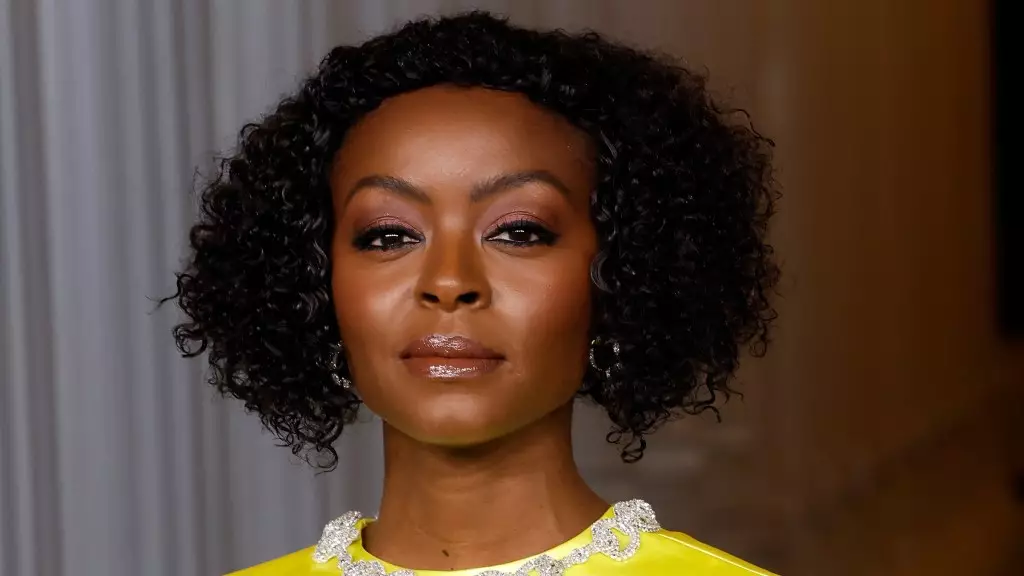Danielle Deadwyler, a powerful presence in contemporary cinema, has been making headlines not just for her performances but also for her insightful commentary on representation and recognition in the film industry. After her striking role in “Till,” which went unacknowledged during the Academy Awards, it’s notable that Deadwyler has taken an evolved stance regarding the accolades associated with her craft. In a recent interview with the Los Angeles Times, she expressed a newfound sense of relaxation about the awards conversation, particularly as she prepares for her role in “The Piano Lesson,” a film that adapts August Wilson’s Pulitzer Prize-winning play.
Deadwyler articulated the importance of prioritizing the essence of storytelling and human connection over the fleeting validation that awards can offer. This shift in perspective is not just personal but resonates with a broader cultural critique: the necessity of recalibrating the values that dictate success in the arts. The actress emphasized, “It’s not about recognition individually. That should not overwhelm one’s ego or psyche.” This sentiment reflects a growing awareness within the industry that the focus should always return to the narrative and its ability to resonate with audiences, rather than merely seeking validation through trophies or accolades.
Amidst her artistic journey, Deadwyler’s narrative has been punctuated by the significant challenges faced by Black artists in Hollywood. The year 2022 was marked by significant controversy surrounding the absence of Black women from major award considerations, specifically with figures like Gina Prince-Bythewood and Viola Davis being overlooked for “The Woman King.” Deadwyler herself found her name in discussions where she was unrecognized, a situation she indignantly addressed as an instance of “misogynoir.” Her perspective challenges the status quo, urging a reevaluation of how the industry recognizes talent across diverse demographics.
This conversation extends beyond mere representations of individual artists; it speaks volumes about systemic issues within Hollywood. Deadwyler articulated a sense of frustration at the inherent biases that often dictate which narratives are celebrated. She highlighted, “Controversy always surrounds Blackness,” which points to a stark reality — such controversies aren’t merely about personal affronts, but are symptomatic of larger institutional failures. As she navigates her role in “The Piano Lesson,” this ongoing discussion becomes as integral to her work as the stories she portrays, framing a narrative that demands equity and acknowledgment in representation.
“The Piano Lesson,” directed by Malcolm Washington, represents a significant contribution to the conversation around the lived experiences of Black families in America. Set to debut on Netflix after a limited theatrical release, the film illustrates the story of siblings who find themselves divided over their family’s legacy as tied to an heirloom piano. Through its compelling narrative, the film promises not only to engage audiences but also to evoke reflections about heritage and familial duty.
Deadwyler’s role as Berniece is particularly significant in that it encapsulates the tension between preserving cultural legacy and the sometimes painful necessity for change. As artists like Deadwyler continue to carve pathways for themselves and others, such narratives become essential to understanding the complexities of Black life in America. They prompt audiences to consider the ways in which legacies manifest, often fraught with tension yet rich with emotional depth.
Ultimately, Deadwyler’s evolving relationship with recognition and awards speaks to a vital call for equitable representation in Hollywood. She urges a collective introspection, advocating for a paradigm shift that pushes for inclusivity in storytelling and recognition. “We have to begin to question ourselves truly if we want a space to have any form of equity,” she emphasizes.
As the industry continues to grapple with issues of representation, it becomes ever more evident that recognizing the nuanced experiences of marginalized groups is not just a passing trend but a necessity for an authentic and enriching narrative landscape. With voices like Danielle Deadwyler’s at the forefront, the hope for a more equitable future in Hollywood remains tangible, highlighting the critical importance of each story shared and each narrative honored. The road ahead may be fraught with obstacles, yet the resilience and commitment of artists like Deadwyler pave the way forward, ensuring that the stories of all peoples are both recognized and celebrated.

Leave a Reply